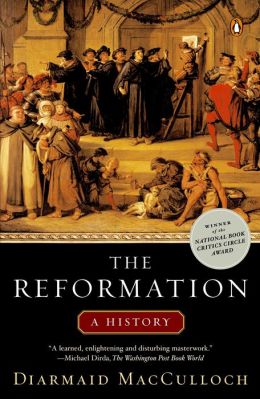Big things change faster than you realize. Perhaps we should think in Decades.
I have been reading The Reformation: A History by Diarmaid MacCulloch. I was generally aware before starting the book that Christianity had begun a very small movement and grown in power and influence until it became the state religion of the Roman Empire.
It occurred to me that Jesus spoke Aramaic, that many of the early Christians must have spoken Hebrew as their principle language, and that as Christianity spread across the mid east it probably did so in Greek. Our earliest documents of Christianity are in Greek.
Clearly, at some time, Christians in Rome began to practice their religion in Latin. Thus, I assume that early in Christian history, some congregations practiced their religion in Greek and others in Latin. Moreover, the split between the Eastern Orthodox and Roman Catholic Churches occurred long before the Reformation.
I have read some about the late Middle Ages when there was a schism in the Roman Catholic Church and when in a reform movement orders of monks and friars were established. That was also a time in which pilgrimage routes became more prominent and there was an increase in funding of churches to conduct perpetual masses.
In this historical light, the proliferation of Protestant sects in the Reformation and the Counter Reformation seem more like a continuation of a very long process of change of Christian Religious institutions.
Of course, looking at more recent American history, I am aware of the rise of a variety of religious movements in the United States from Mormonism, to Christian Science, to the churches serving black communities, to various cults.
The processes of change in Christianity continue. The Catholic Church and the Eastern Orthodox Churches proudly point to continuity dating back to the lifetime of Jesus Christ. I suspect that many people fail to understand the nature of that continuity and of the changes that Christianity has accepted.
Political Institutions
The Economist recently published an article stating:
A CONSTITUTION “naturally expires at the end of 19 years” wrote Thomas Jefferson, one of America’s Founding Fathers, in 1789. This, he calculated, was the length of a generation. More than 200 years and 800 constitutions later, the life expectancy of a constitution proves indeed to be about 19 years.Ancient Egyptian civilization lasted thousands of years with relatively little change. We think of the Roman Empire as lasting a thousand years, or more if the Byzantine Empire is included.
England claims a long lasting government, but the British Empire that existed when I was born in 1937 is long gone, as are the contemporaneous French, Portuguese, Dutch, and Italian empires.
Most of the nations in the United Nations gained their independence in my lifetime.
The U.S. Constitution dates to 1789, with relatively few amendments since. There is a tendency to focus on the continuity in American government, and originalists in the Supreme Court believe that the Constitution should be interpreted as its framers intended rather than as a living and changing agreement. Many conservatives in this country decry the changes in our society, yet the United States is a very different country than was the nation of 1789 of a couple of million people (that we can hardly understand) clinging to the east coast of a continent dominated by Indian tribes, and living in fear of the more powerful military and naval forces of England, France and Spain.
Final Thoughts.
I have lived through the second Vatican Council and its impact on the Roman Catholic Church. I am aware of debates in Christian communities on family planning, ordination of women, homosexuality, sexual misconduct of priests, the treatment of women during out-or-wedlock pregnancies and their children and the language of the mass.
I have lived through the break up of the Soviet Union and Yugoslavia and the birth of Israel, the division of Korea and the unification of Vietnam.
Yet I tend to think of institutions as permanent, or at least with a great deal of resistance to change; I may be unhappy with the politics of today, but I fear little can be achieved in the next election to reform them. Of course, thinking in deep history, or even with a historical time frame of a few centuries, institutional change is obvious. Perhaps my problem is that I should think more in terms of a few decades, rather than a few years or a few centuries.
The fight for human rights has made significant progress in the United States in the half century since President Kennedy was assassinated, not only for African Americans, but for Woman and for gay and lesbian rights. It is hard to imagine Pope Francis being chosen by the College of Cardinals when President Kennedy was facing the possibility that his Catholic Church affiliation might prevent him from being elected president.

No comments:
Post a Comment